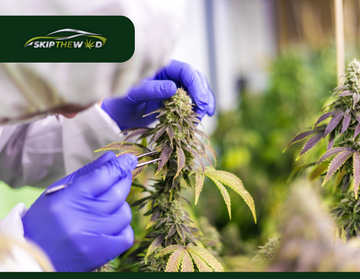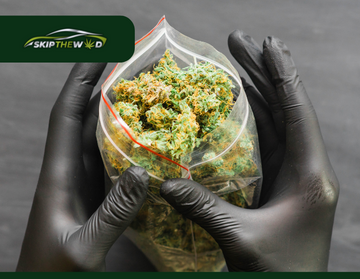Drug dogs, also known as K9s, are often relied upon by law enforcement to detect illegal substances, including drugs, explosives, and even cash. But with the growing popularity of cannabis edibles, many people wonder if these specially trained dogs can detect edible marijuana products. After all, edibles, unlike traditional cannabis in plant form, are often infused into food products like brownies, gummies, and chocolates. So, can drug dogs smell edibles? Let's break it down.
Understanding Drug Dog Training
Drug dogs are trained to detect certain scents associated with illicit drugs, typically through their exceptional sense of smell. Dogs have an olfactory system that is up to 100,000 times more sensitive than humans. This allows them to identify the specific odor of substances like marijuana, cocaine, heroin, methamphetamine, and even opioids. Dogs are trained to recognize the scent of the active ingredients in these substances, which are often present in the raw form.
The Key Scent: Delta-9-THC
When it comes to marijuana, the main active ingredient that drug dogs are trained to detect is delta-9-tetrahydrocannabinol (THC). THC is the compound responsible for the psychoactive effects of marijuana, and it is present in both cannabis flower and edibles. While the form of the cannabis product may change, the scent of THC remains a key target for detection.
Do Drug Dogs Smell Edibles?
Yes, drug dogs can smell edibles, but the way they detect them may be slightly different than when they are searching for raw marijuana. Edibles are typically infused with THC, and this compound is still detectable by a dog’s nose. However, because edibles are often mixed into food products, the scent of the THC might be masked by other food odors, such as chocolate, fruit flavors, or sugar.
Despite the masking effect of other ingredients, drug dogs are highly trained to focus on specific scents, and they can still detect the trace amounts of THC in edibles. Some studies and reports have shown that drug dogs can successfully alert on foods containing THC, even when those edibles are wrapped or packaged in ways that make the scent less obvious.
Challenges in Detecting Edibles
While drug dogs are capable of detecting edibles, it can be more challenging in certain circumstances. The food-based packaging may conceal the scent of THC, especially if it is tightly sealed or contains a strong odor of its own. Additionally, since edibles are often processed or baked, the scent of THC may not be as concentrated as it is in the raw cannabis flower, which can make detection more difficult.
Furthermore, some dogs may be more accustomed to detecting cannabis flower rather than infused food products, which can result in a lower rate of detection for edibles, depending on the dog's training.
Factors Affecting Detection
There are several factors that influence whether or not a drug dog can detect edibles:
- 1. Type of Edible: The form of the edible can impact how well the dog can smell it. For instance, gummies or candies may be easier to detect than baked goods like cookies or brownies, which might have a more complex scent.
- 2. Packaging: The way the edible is packaged can also play a role. If an edible is tightly sealed in an airtight container, the scent might not escape, making it harder for a dog to detect. On the other hand, if it is poorly sealed or exposed, the scent will be more accessible to the dog’s keen nose.
- 3. Concentration of THC: The concentration of THC in the edible matters too. A highly concentrated edible, such as a potent THC-infused oil or a product with a high THC dosage, is more likely to be detectable compared to a product with low THC content.
- . Training of the Dog: Not all drug dogs are trained to detect edibles. While many are trained to smell marijuana in plant form, some are specifically trained to detect THC-infused products. The success of detection depends on whether the dog has received this specialized training.
Legal and Practical Considerations
In regions where cannabis is legal for medical or recreational use, the presence of edibles may still be a concern if they are not properly handled or if they are consumed or transported illegally. For example, if an individual is traveling with edibles across state or national borders where cannabis remains illegal, a drug dog trained to detect THC may alert law enforcement.
For those who legally consume or transport edibles, it is important to be mindful of how they are stored and transported. If you are traveling with cannabis edibles, it’s always best to check the local laws and regulations to ensure you comply with the rules.
Conclusion
In conclusion, drug dogs can indeed smell edibles, although it might be more challenging depending on the product's packaging, the concentration of THC, and the training of the dog. While their incredible sense of smell can detect the THC in edibles, factors such as food odors, packaging, and the specific edible can influence whether the dog successfully alerts. Whether it’s marijuana in its raw form or infused into a food product, these highly trained dogs can identify the signature scent of THC. If you're concerned about traveling with edibles or their potential detection, it’s always advisable to stay informed about your local laws and regulations.









